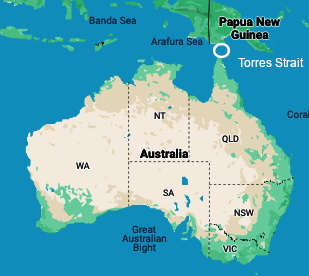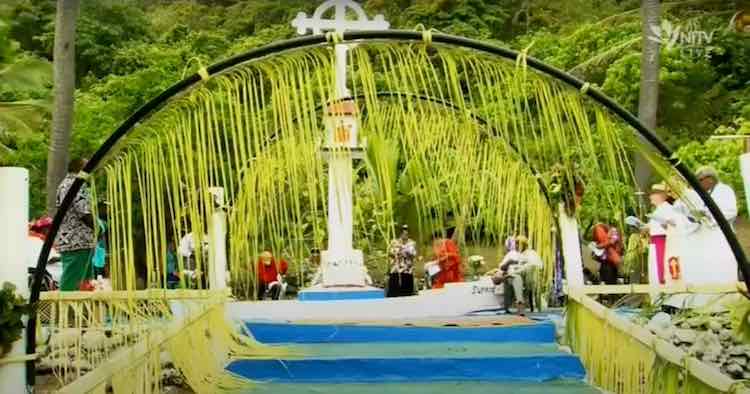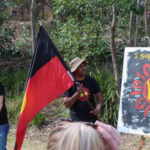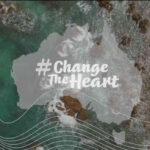Indigenous peoples all over the world have suffered from colonialism, as European nations invaded, occupied and overran the original inhabitants. Many indigenous people remember their history since those times with sadness, anger and loss.
But the Torres Strait islanders in northern Australia have a more positive history and memory.
Torres Strait islands
Torrres Strait (Zenadh Kes) separates the northern tip of Australia from Papua New Guinea. It is named after Spanish navigator Luís Vaz de Torres, who sailed through the strait in 1606.

But obviously the waters of the Strait were known long before that. 38 of the 134 islands within Torres Strait are home to the Torres Strait Islanders, Melanesian people closely related to the people of New Guinea. They have inhabited these islands for several thousand years, and likely much longer.
As you’d expect, theirs is a strongly maritime culture. There is evidence of significant interaction in the past, and trading with Papuans to the north and Australian Aborigines to the south.
The islands and their communities are now part of the Australian nation.
The Coming of the Light
On July 1, 1871, missionaries from the London Missionary Society landed on one of the remote islands, Erub (also known as Darnley Island), accompanied by evangelists from the Loyalty Islands in present day New Caledonia. They were met by a local elder who welcomed them and introduced them to the island’s inhabitants. From there Christianity was received and warmly embraced by the Islanders.
This event is remembered fondly as “the Coming of the Light” because the Christian faith united the various island communities and brought a time of greater peace between them.
Every year on July 1, the inhabitants of the islands and the expatriate community on the Australian mainland celebrate the Coming of the Light with food, song and prayer.
“God was on both sides of the beach”
While the islanders, and Christians generally see the coming of Christianity to these islands as a blessing, there are some who question whether the Islanders already had light, for they, like Australian Aboriginal peoples, already had an awareness of, and a relationship with, a Creator Spirit.
So, some say, “God was on both sides of the beach” when the missionaries arrived. God had been active in their community, just as he had in many other communities around the world.
But the missionaries brought the gospel, the story of Jesus who is the light (John 8:12), who at the very least added to the Islanders understanding of God and how to live in peace, and for that they are thankful.
Sensitivity to indigenous peoples
I belong to a colonising people. I live in Australia because my ancestors and their government in Britain colonised Australia with little regard for the First Nations people. That process cannot be undone, but I recognise the pain, suffering and loss that it has caused. There has of course been benefits as well, but the loss weighs deeply on my First Nations friends.
The Torres Strait Islanders haven’t suffered in the same way, but their lives have still been impacted by white colonisation.
One way Christians and churches can walk with our indigenous sisters and brothers is to recognise their spirituality and their special days and times, and celebrate with them, including giving them time and space in our churches.
Yesterday we did just that in the church I attend. A Torres Strait Islander elder told us the story of the Coming of the Light, including his memories of his grandfather telling the story to him, then led us in song and prayer.
I am so glad to be in a church that is multicultural, recognises and supports First Nations peoples, and seeks to be reconciled with our colonial past.
Photo of Coming of the Light celebrations is taken from the video Celebrating ‘Coming of the Light’ in the Torres Strait.
Further reading
- Celebrating ‘Coming of the Light’ in the Torres Strait. NITV on Youtube.
- Coming of the Light. Deadly Story. (For those unfamiliar with Aboriginal usage, “deadly” is a positive word.)
- Torres Strait, Torres Strait Islanders and Coming of the Light Festival on Wikipedia.





Your Torres Straight Island friends sound like lovely people and it’s great that disparate groups can come together with a common purpose rather than with ingrained differences.
All the best for your Church and may its influence spread!
Thanks.